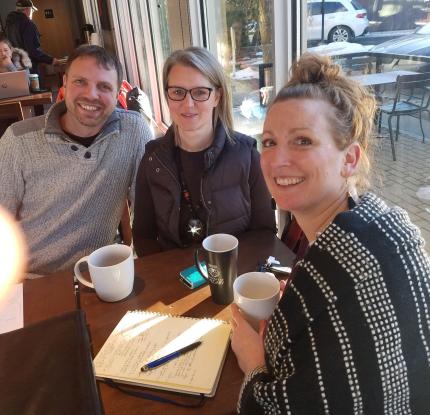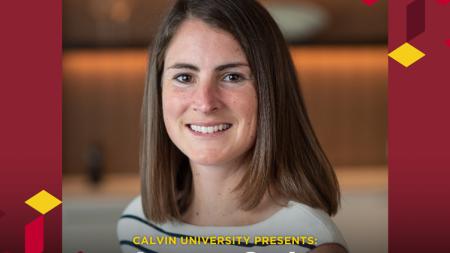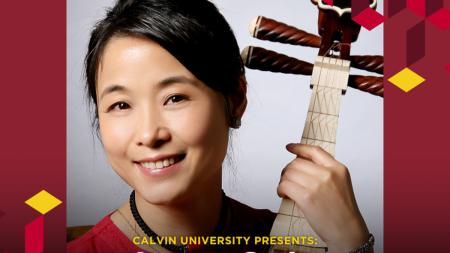A Campus Pastor Asks, What If We Were No Longer Here?

Paul Verhoef and Pearl Nieuwenhuis, chaplains at the University of Calgary, and (far right) Jacqui Mignautt, chaplain at Mount Royal University in Calgary.
Chris Meehan
In coming months, CRC News will feature articles that tell the story of campus ministries in the U.S. and Canada. Now a part of Resonate Global Mission, these ministries have developed a vision that helps them address issues facing society today. This is the first of these stories.
Fresh out of Calvin Theological Seminary, Paul Verhoef was called to serve as the first Christian Reformed chaplain at the University of Calgary in Calgary, Alta. He recalls arriving at his newly renovated, freshly painted office on Aug. 3, 2004, and looking around.
There was no furniture in the room. The office was just a 10-by-10-foot space connected to seven other empty offices along a common hallway and joined by a gathering space, said Verhoef. A new thing was starting, but work had to be done.
“For the first few days, I needed to bring my own folding chair and card table, and I set up shop – with very little idea of what to do next. I wondered how I was going to build this ministry,” he said.
Verhoef had studied engineering in college and had later decided to go into pastoral ministry. Becoming a chaplain wasn’t necessarily on his radar until he completed seminary — and yet there he was, called by God to work on campus.
At some point soon after starting as chaplain, Verhoef reviewed the job description crafted for this campus ministry, which is today one of 35 campus ministries in the Christian Reformed Church in North America , and he pondered whether following it would lead to success. For years campus ministries were part of Christian Reformed Home Missions and today are a ministry of Resonate Global Mission.
The job description began by saying the aim of campus ministry was “to educate and witness to the reign of Jesus Christ according to the following two overarching goals. . . .”
The first goal, Verhoef explained, was to educate and mentor students, “connecting their faith creatively to their studies within the framework of a Christian worldview.”
The other goal, he said, was that “the campus minister will serve as a leavening agent of God’s kingdom within the campus milieu, on a mission of love to the intellectual world of the academy.”
And this, he decided, was it: the core of CRC campus ministries, an effort that began in the 1930s. Verhoef was there to love the people studying, teaching, and working at the university.
Other campus ministers such as Bill VanGroningen and Peter Schuurman had reminded him that we are formed in God’s love and that this love was what he needed to show in his work. Love, they said, is always at the edge of doing ministry, whether on a college campus, in a church, or elsewhere. Love is what makes it happen.
But making ministry happen, Verhoef realized, was going to take time. In those early days, he had an empty calendar, a job description but no agenda, and goals but no clear way to achieve them.
“I needed to remember that love is patient – and a ministry to a campus must be patient too,” Verhoef wrote in an article he sent to CRC News for this story.
“It takes time to get to know a place, a people. It takes time to become a part of the community, to be trusted. It takes time to make a difference, especially if we want those changes to be locally owned and not pushed on the university from the outside.”
Seeking to Reach a Secular Culture
Making CRC campus ministries on secular campuses fairly unique is that they are located right at the heart of the culture. They are doing work in places of great diversity among students and staff who come to the campus from all over the world with various points of view and from different religious backgrounds or none at all. At the University of Calgary and elsewhere, faith is not necessarily an important item on the agenda. At the University of Calgary and similar institutions, what matters is research and inquiry into topics using the scientific method, in which the miraculous has little place unless it can be measured and proven.
This often means that campus ministries find themselves addressing any range of issues — which today frequently involves issues of human sexuality — long before the local church has to do so. CRC campus ministries are there to enhance the faith life of CRC students, but they also have a wider purpose: to address the tough topics of the day but especially to show love and seek to make God real.
In his 15 years on campus, Verhoef has assumed many roles, he said, and sometimes that has included mitigating controversial debates. But he has always worked with the goal of trying to achieve mutual understanding among people, he added, because this is an important part of what it means to love.
“I had to ask, ‘Is it possible for a campus ministry to serve, to support, to live in a mutually supportive relationship with the university?’” he writes.
“Can we appreciate its work, its research and teaching focus? Can we sympathetically understand its habits and concerns – and if we at times call it to task, can this be done as someone who supports the university, who is seen by the university as a person who loves it, a person who is part of the university?”
The answer has been yes, Verhoef said — and he has done this in many ways. He has helped to organize and present interfaith dialogues, he has brought speakers to campus for lectures and presentations. He holds services and Bible studies, and he has brought in the Blanket Exercise, which tells the story of the European oppression of Indigenous peoples. He has worked for social justice, serving on committees and helping to organize actions to bring about change.
A Loving Presence
Especially, Verhoef has been the voice of the loving presence of God at times of crisis, such as after the death of a student, said Debbie Bruckner, director of the university’s wellness center. Verhoef has helped to hold services for students who died and has been there to speak with and listen to students and family members grieving a death.
Bruckner especially recalls how Verhoef — along with the other CRC campus chaplain at Calgary, Pearl Nieuwenhuis — helped her provide assistance to students and staff after the April 2014 stabbing death of five young adults attending an end-of-year, off-campus house party. Matthew de Grood, the son of a Calgary police inspector, was charged in the crime but found not responsible due to his mental condition.
Students across the campus were shocked and devastated by the mass murder. As a result, it became necessary to reach out to them and gather with them in many places — in classrooms and dorms, in areas outdoors both on and off campus, in dining halls, and in the chapel.
“Paul and Pearl were there and able to help young people navigate through the painful process,” said Bruckner.
Verhoef asked Nieuwenhuis to join his office eight years ago to add an important dimension to the ministry. She is a trained Spiritual Director and meets with students in all kinds of situations, from trying to deal with a tragedy or just the everyday challenges of college life.
“In my work, I try to help create a gentle space where people can enter in and feel safe to look at their inner life,” she said. “I’m here to accompany you wherever you are.”
Verhoef himself meets regularly with students, some of whom are CRC and are trying to decide if they want to remain in the church, and others of whom are from a different culture and are trying to fit in on the campus.
“I find myself pastoring them in one way or another, helping them find their place in the diversity of the campus world,” Verhoef said.
Showing Love
Yet another way Verhoef has found to show love to students has been in helping to create the Kaleidoscope Project, a journey of interfaith discovery for Calgary students.
Developed through the college’s Faith and Spirituality Centre, home to many of the campus’s chaplains, the Kaleidoscope Project is an eight-day immersion experience — from Saturday evening through the following Saturday afternoon — in which participants are introduced to various world religions.
During the event, participants study about and make sacred-site visits to various nearby religious communities. They normally visit an Ismaili Jamatkhana, a Hindu Mandir, a Sikh Gurdwara, a Buddhist temple, and an Orthodox Catholic church.
As part of the experience, students in the program, who come from a range of backgrounds, discuss a case study that sharpens some of the questions faced by communities as they live out their faith in the world.
Pearl Nieuwenhuis has taken part in the project and characterizes it as “being 'dunked' each day into a new religious community.”
“The dunking was, on the one hand, just an introduction — a tiny peek into the lived faith of one person and the sacred space shared with others in their religious community. On the other hand, the dunking was intense — rich in surprises — the hospitality of each community was so beautiful; the openness and vulnerability of the students was humbling,” she said.
Verhoef said this is a program that tries to show students both the similarities and deep differences between faith traditions. In the process, he said, students have the chance to deepen their own faith and “are encouraged to wrestle with who they are and who they want to be in a world full of possibilities.”
For its work, the Kaleidoscope Project received the “Outstanding Spiritual Initiatives Award” at the 2017 NASPA Conference; NASPA is a leading association for student affairs professionals working in higher education.
The Kaleidoscope Project was “the single most inspiring program that I have ever come across to learn about religious diversity in a safe and immersive environment,” said one student.
“Being in the presence of others who are so curious yet respectful and courageous to ask questions taught me a lot as to how I can do it too,” said another.
Other Students
Allison Goerzen, who is finishing a bachelor’s degree in development and women’s studies, finds time every week to stop into ARISE, a space set aside by Verhoef that is quiet, dimly lit, and completely focused on whatever is needed that week.
“Sometimes it’s been a spiritual practice or reflection; other times it’s been a chance for us to vent and wonder together about alternative possibilities to our struggles,” she said.
“Overall, though, it’s been one place I know I can go each week that is going to be restful and rejuvenating.”
Dustin Pearson got to know Verhoef during Wednesday-evening dinners and discussions in which the chaplain provided a safe place to ask questions and talk about matters of faith. More than that, Verhoef has been a mentor and pastor, having married Pearson and his wife.
Pearson said, “Campus ministry has meant a lot to me and has radically transformed who I am. . . . In my second year I became a Christian. . . . Campus ministries have made me a better person, more aware of those around me, and engaged in the present and current communities that I inhabit.”
Coming from a Mennonite background, Jonas Cornelson met Verhoef when he was in graduate school. As soon as he started to talk, Cornelson said, he felt comfortable sharing with the campus minister struggles he had been having with his faith. Cornelson and a few others met for contemplation and prayer over lunch hours this past semester.
“Paul is an open, non-judgmental listener,” he said. “I commend him for his commitment to building intentional community, to the extent that it is possible at a large, sprawling campus like ours.”
Am I a Good Neighbor?
Being a good neighbor to the people he meets is the simple answer to the big questions he asked when he started out 15 years ago, said Verhoef.
He recalls Bill Van Groningen once asking him to imagine a church in a neighborhood. If that church had to shut down, would people in the neighborhood who were not members of the church even care? How did the church relate to the neighborhood? Did it connect with people to find ways to share life and challenges together? Did it try to translate the message of Jesus into words and actions that affected the neighborhood? Or did that church remain aloof?
“Listening to Bill, I had to ask, If the CRC left this campus, would we be missed?” Verhoef said.
Over the years, Verhoef has seen how God is always at work — that the Spirit of God is always moving, breathing, creating life, reconciling God’s world back to God, and doing this on the campus in Alberta.
“Perhaps one of the invitations to be a good neighbor in this community is to simply pay attention and ask, Where is the Spirit of God doing good and beautiful things?” Verhoef said.
“Can I come alongside of those places and lend support, put my shoulder behind the work being done, and work side-by-side with other staff, faculty, and students to make something beautiful happen?”
Looking back over his time at Calgary, Verhoef is confident that in many public and private ways he has become a good neighbor. With God’s help, he has touched hearts and minds with Christlike love, and he has been a voice speaking into a secular world that tends to look away from things that are divine.
Verhoef added that he hopes and prays the university would miss the CRC presence if it were no longer there.


